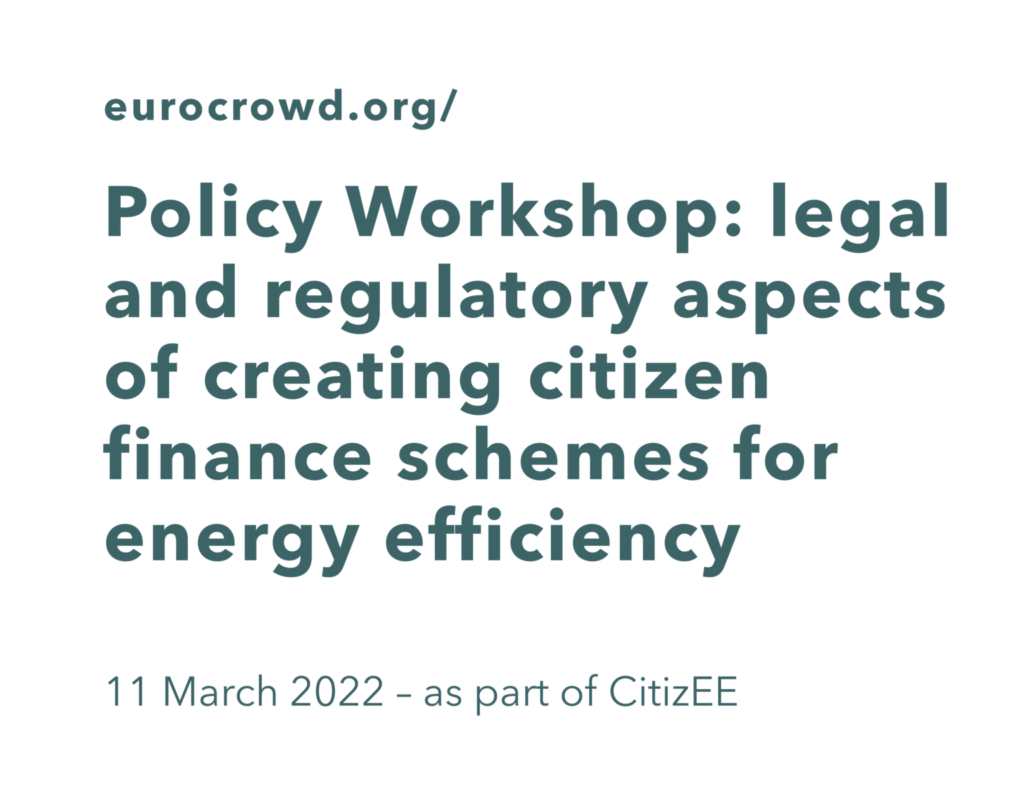CitizEE Institutional, organisational and procedural report
Citizen Financing EFSI Investment Platforms - 30 January 2020
As part of CitizEE project results, this report describes what EFSI-backed Investment Platforms are and how CitizEE H2020 project pilot regions can access the funds provided by the European Fund for Strategic Investments (EFSI) in order to set-up such investment platform to support the funding of their CFs4EE Financing Schemes.

The purpose of this document is to provide a guide to establish EFSI-backed investment platforms for the CitizEE H2020 project pilot regions implementing Citizen Funding for Energy Efficiency (CFs4EE) Financing Schemes to finance large scale energy efficiency and renewable energy retrofitting programs in the building sector.
The Regulation N°2015/1017 establishing the European Fund for Strategic Investments (EFSI), specifically offers to finance investment platforms with a view of invigorating investments in a portfolio of projects (as opposed to individual projects) with a thematic (e.g. energy efficiency investments, broadband, or SMEs) or geographic focus (e.g. several Member States, or at regional level). The interest of setting-up investment platforms relies on the fact that these investment platforms are a means to aggregate investment projects and bundle funds from different sources (EU funds, national support, private investors) to enable diversified investments with a geographic or thematic focus. The Platform itself can then provide loans, guarantees and/or equity financing to the underlying projects, depending on their specific needs. In doing so, they help to better share the risk amongst investors, make it easier to attract private investors and eventually unlock financing for individual projects.
Unlocking financing for smaller and/or riskier projects is precisely the objective of the European Fund for Strategic Investments (EFSI), the financial pillar of the Investment Plan for Europe. EFSI was designed in 2015 to address the major investment gap resulted from the outbreak of the global financial and the European sovereign debt crises. EFSI came to complement existing EU financing instruments and was aimed at mobilising significant additional public and private investment, worth €500 billions for 2020 in crucial sectors of the EU’s economy that suffering from market failures and sub-optimal investment situations by providing first loss guarantees from the EU budget. The specificity of EFSI is based on this EU guarantee granted to the European Investment Bank (EIB) Group that allows to increase the volume of higher risk projects supported by EIB Group financing operations and is intended to provide additionality of investment by addressing market failures and suboptimal investment conditions, i.e. funding projects that would otherwise not be financed or not to the same extent. Thanks to the EU guarantee, the EIB Group can expand its financing and investment portfolio to those projects with a higher risk profile (namely EIB Group “Special Activities”) and in turn, the EIB intervention allows other public and/or private investors to join (process defined as ‘crowding in’) and further multiply the overall funding of operations that receive EFSI financing.
Thanks to the EFSI funding, an investment platform can therefore be set up to provide financial products (loans, equity, guarantees) to projects that are economically viable (either by generating revenues and/or saving costs) but which are too small and/or too risky to be financed by private investors only and thus use public financing to attract and crowd-in more easily private investors, with a view to fill market gaps and finance groups of smaller and riskier projects. In addition to EFSI funding, investment platforms can also combine funding from other EU funds and financial instruments, in particular the European Structural and Investment Funds (ESI Funds) as specifically promoted by the EFSI regulation in a view to contribute to the financing of projects receiving EFSI support and by there increase the crowding in effect of the Investment Platform.
It is to be noted that any public or private institution or a group of institutions (so-called “Sponsors” or “Project promoters”) can set up such an EFSI-backed investment platform. This can also include creating new forms of cooperation between key financial organizations like National Promotional Banks/Institutions (NPBIs), commercial banks, investment funds and other investors and stakeholders. Another particularity of EFSI-backed investment Platforms is their flexibility in terms of legal form and financing structure which can be determined according to the needs of the projects and the interests of the co-investors. According to the EFSI regulation, they can be “special purpose vehicles, managed accounts, contract-based co-financing or risk sharing arrangements or arrangements established by any other means by which entities channel a financial contribution in order to finance a number of investment projects”. This flexibility allows investment platforms to adapt to a large range of market situations, co-investors and policy objectives.
As of the end of june 2019, some 51 investment platforms have already been approved to receive EFSI-backing, representing nearly EUR 6bn of EFSI financing approvals, for more than EUR 40bn of investments expected to be mobilized.
Download the document here



